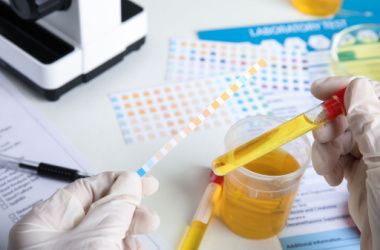General Health
Which Diseases Can Be Diagnosed With A Urine Test?
4 min read
By Apollo 24|7, Published on - 15 September 2022, Updated on - 15 August 2023
Share this article
0
7 likes

How frequently have you been advised to get a urine test? Whether once, or not, it is imperative to understand what a urine test is all about. A urine test, also known as urinalysis, analyses the physical, chemical and microscopic components of your urine (pee). A urine test is frequently used by medical professionals to identify urinary tract infections as well as to screen for or monitor a number of prevalent health disorders, including diabetes, liver disease and kidney disease (UTIs). While a urine sample can be used to evaluate a variety of elements of your health, your doctor will decide which tests to request as part of a urinalysis based on your symptoms and the circumstances.
The Purpose of a Urine Test
A urine test can be recommended to:
- To determine your general health: A typical medical exam, pregnancy check-up or pre-surgery preparation may include a urine test. When you are admitted to a hospital, it may also be used to screen for a number of diseases, including diabetes, renal disease and liver illness.
- To determine a disease's cause: If you experience back pain, frequent or painful urination, blood in your urine or other urinary issues, then a urine test may be required.
- To keep an eye on a health situation: Your doctor might advise routine urine testing if you've been diagnosed with a medical problem, such as kidney disease or a urinary tract infection, to monitor your condition and treatment.
Which examinations are parts of a urinalysis?
A urinalysis may involve different tests, according to your healthcare practitioner. Your doctor will decide which urine tests to conduct based on your symptoms and pre-existing medical issues. A medical professional or laboratory technician can generally check a urine sample for the following common things:
- Both appearance and colour
- Chemical results
- Microscopic evaluation
Diseases that can be detected with a urinalysis
Urine testing can identify some of the most prevalent illnesses, such as diabetes, kidney failure and several cancers. Some of these diseases include:
1. Urinary Tract Infections: UTIs (urinary tract infections), commonly caused by the E. Coli bacteria, affect both men and women. UTIs affect about 8% of males overall, compared to nearly 40% of women. In their lives, 20% of all women will experience at least one UTI. The most typical symptoms include burning and painful urination, blood or strong-smelling urine.
2. Kidney Function: People suffering from type 2 diabetes are at high risk of developing microalbuminuria. Microalbuminuria is a disorder characterised by elevated quantities of albumin in the urine. Microalbumin should be within limits to ensure the proper functioning of the kidneys.

3. Cancer Screening and Diagnosis: One of the most popular and affordable cancer screening techniques is a urine test. A urine test can help identify different types of cancers including cancer of the bladder, ureter and kidneys. Furthermore, blood in the urine is a strong sign of an illness in the body, such as a kidney stone, urinary tract infection or perhaps even cancer.
4. High Blood Pressure: Urine catecholamine testing can be used to determine whether a person's high blood pressure is caused by an overproduction of hormones such as normetanephrine and metanephrine. This is evident in diseases like pheochromocytoma when an adrenal gland tumour causes excess production of the hormones noradrenaline and/or adrenaline, which raises blood pressure.
5. Sexually Transmitted Diseases: A routine urine test can help determine the presence of STD-causing microorganisms such as trichomoniasis.
How do I get ready for a urine test?
Make sure you've consumed enough liquids, such as water prior to your urinalysis test. In most cases, the patient is asked to give the first urine of the day for analysis. Your doctor could advise you to stop using a particular medicine because it might alter the results of a urine test. You should only stop taking your prescriptions if your doctor instructs you to. Before taking a urine sample, it's crucial to let your doctor know if you're menstruating (on your period). Vaginal discharge and menstrual blood might affect the outcome of some urinalysis tests.
Like other periodic tests, urine tests should be done after a particular interval. It can assist in identifying issues that require treatment, such as infections or kidney issues. Additionally, it can aid in the early detection of major ailments, including renal disease, diabetes or liver disease.
You can also book a urine test from the Apollo 24|7 app.
Click To Book A Urine Test
Medically reviewed by Dr Sonia Bhatt.
General Health
Leave Comment
Recommended for you

General Health
The Benefits of Yoghurt in Shingles Recovery
Uncover the potential benefits of yoghurt during shingles. Learn if yoghurt can aid in the recovery process. Get informed now.

General Health
Plugged to Your Headphones For Long? This is Why You Should Stop It Immediately!
Headphones have become an integral part of our daily life. Whether travelling, jogging, or cooking, we remain plugged into our headphones to keep ourselves entertained. But, did you know this habit can actually cause hearing loss?

General Health
20 Things You Must Have In Your First-Aid Kit
Every house should have a first aid kit to handle emergencies. From antiseptic lotion to bandages, cotton rolls and disposable gloves, here are 20 items that you should have in your first aid kit.
Subscribe
Sign up for our free Health Library Daily Newsletter
Get doctor-approved health tips, news, and more.
Visual Stories

The Best Exercises for Controlling Blood Sugar Levels
Tap to continue exploring
Recommended for you

General Health
The Benefits of Yoghurt in Shingles Recovery
Uncover the potential benefits of yoghurt during shingles. Learn if yoghurt can aid in the recovery process. Get informed now.

General Health
Plugged to Your Headphones For Long? This is Why You Should Stop It Immediately!
Headphones have become an integral part of our daily life. Whether travelling, jogging, or cooking, we remain plugged into our headphones to keep ourselves entertained. But, did you know this habit can actually cause hearing loss?

General Health
20 Things You Must Have In Your First-Aid Kit
Every house should have a first aid kit to handle emergencies. From antiseptic lotion to bandages, cotton rolls and disposable gloves, here are 20 items that you should have in your first aid kit.

